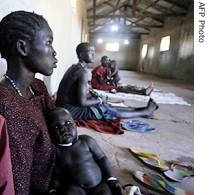2007年VOA标准英语-Rights Group Protests Stoning of Women in Sudan
搜索关注在线英语听力室公众号:tingroom,领取免费英语资料大礼包。
(单词翻译)
By Noel KingKhartoum
22 March 2007
The human rights group Amnesty International says two women have been sentenced to death, by stoning, in Sudan for committing adultery. The sentence has raised questions about Sudan's penal1 code, based on Islamic Shari'a law, which rights groups say has been used unfairly in the majority-Muslim nation.
 |
| Sudanese women prisoners wait in Rumbek's central prison after being sentenced to six months in prison for adultery (File) |
Fadul was sentenced in mid-February and Daldoum in early March.
Both women are from the war-torn Darfur region. Amnesty International charges one of Fadul's children has been imprisoned2 along with her.
Sudan's legal system is based in part on an Islamic code of law, known as Shari'a.
Under Shari'a law, the death penalty can be applied3 in cases of murder, adultery or leaving Islam for another religion.
Rights groups charge that Shari'a law has been unfairly applied in Sudan.
Faisal El Bagir, a prominent human rights activist4 with the Khartoum Center for Human Rights and Environmental Development told VOA that he respects the tenets of Shari'a law.
But he stresses the laws must be applied correctly.
"I do respect Shari'a and Islam, as I respect all religions. But the application of Shari'a law, whether in Sudan or Afghanistan, is not the real Shari'a. This is not Islam. Islam is bigger than just punishing people. It's a way of life," he said.
Amnesty International called the trial unfair, charging that it was conducted in Arabic, which is not the women's native language.
Both women speak tribal5 languages from the Darfur region.
Rights activist El Bagir tells VOA there was little chance the women understood the proceedings6.
"The women definitely are not understanding the language of the court and they did not understand the procedures," he said. "The Arabic language, which is the language of the court is not their mother tongue".
But Sudanese officials insist that rights groups have painted an unfair picture of Sudan's legal system.
The president of the Sudanese Bar Association, Fathi Khaleel, tells VOA it is highly unlikely the women will actually face death.
Khaleel said there are at four appeals processes that must be exhausted7 before a death sentence is carried out.
"The law is very clear. There is no punishment of stoning here. This is a politically motivated step from Amnesty International," he said. "There is no sentence of stoning here in Sudan, at all. They know that. This is politically motivated."
According to news reports the two women have not yet filed an appeal with Sudanese authorities.
Before a death sentence is carried out in Sudan, it must be approved by Sudanese President Omer Al Bashir.
 收听单词发音
收听单词发音 




